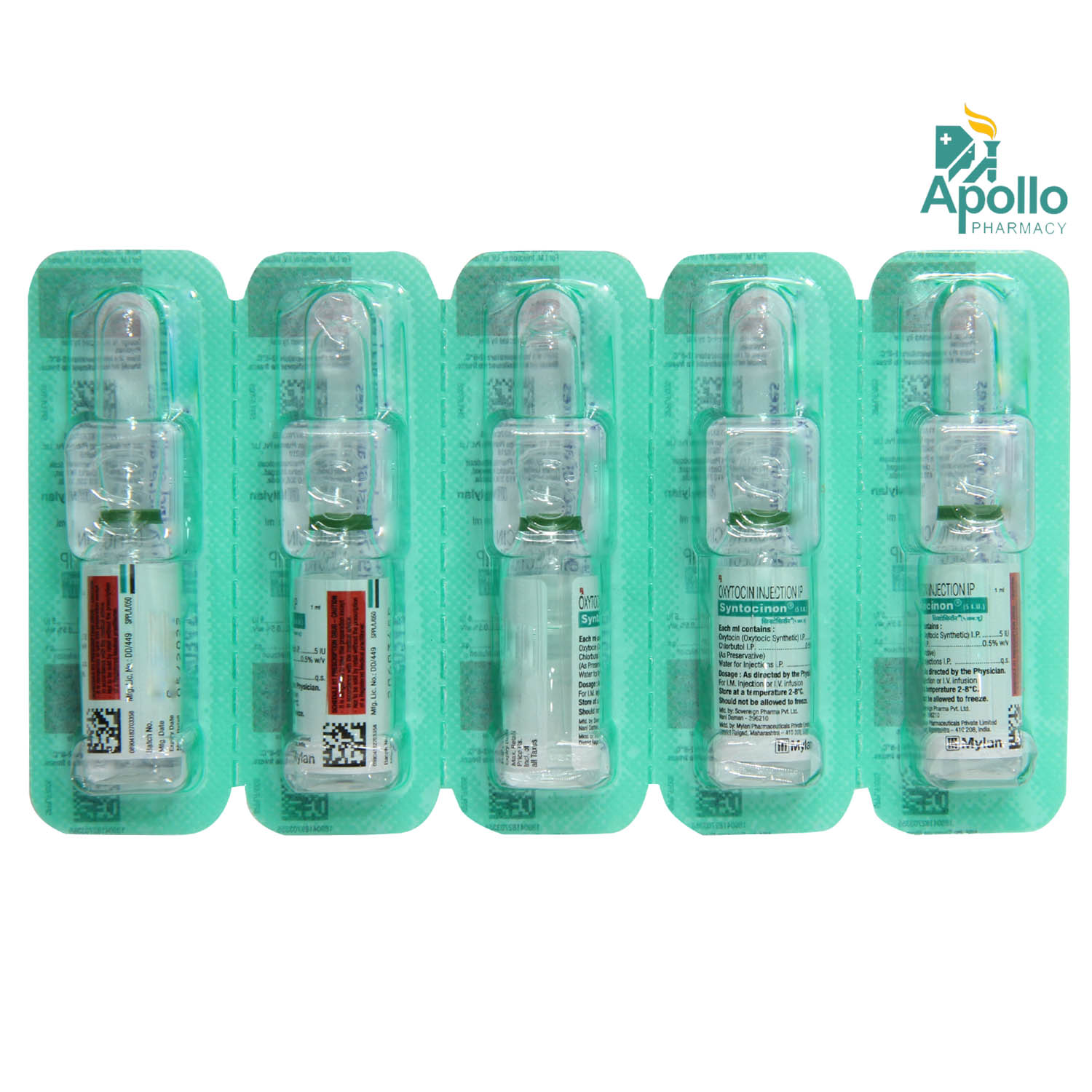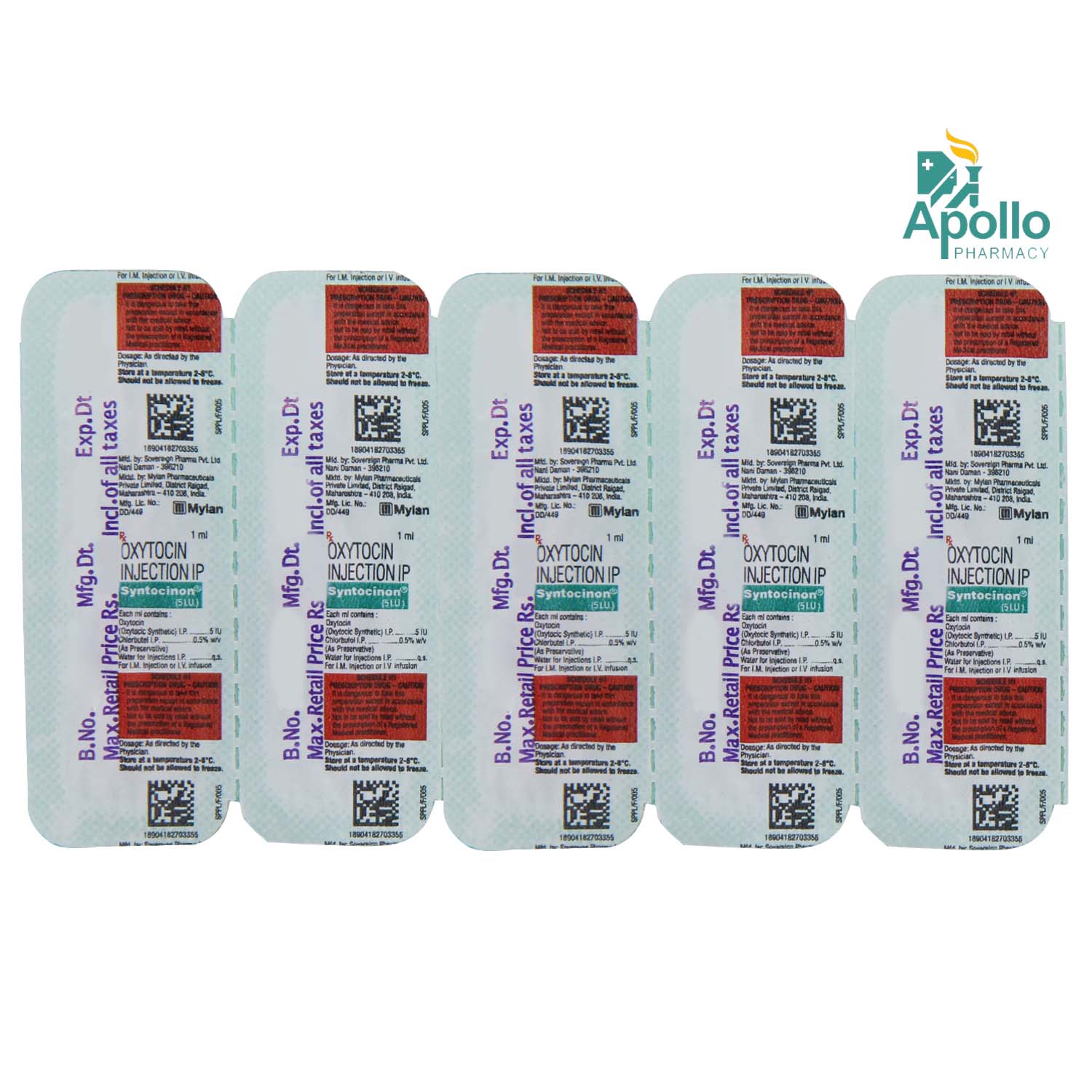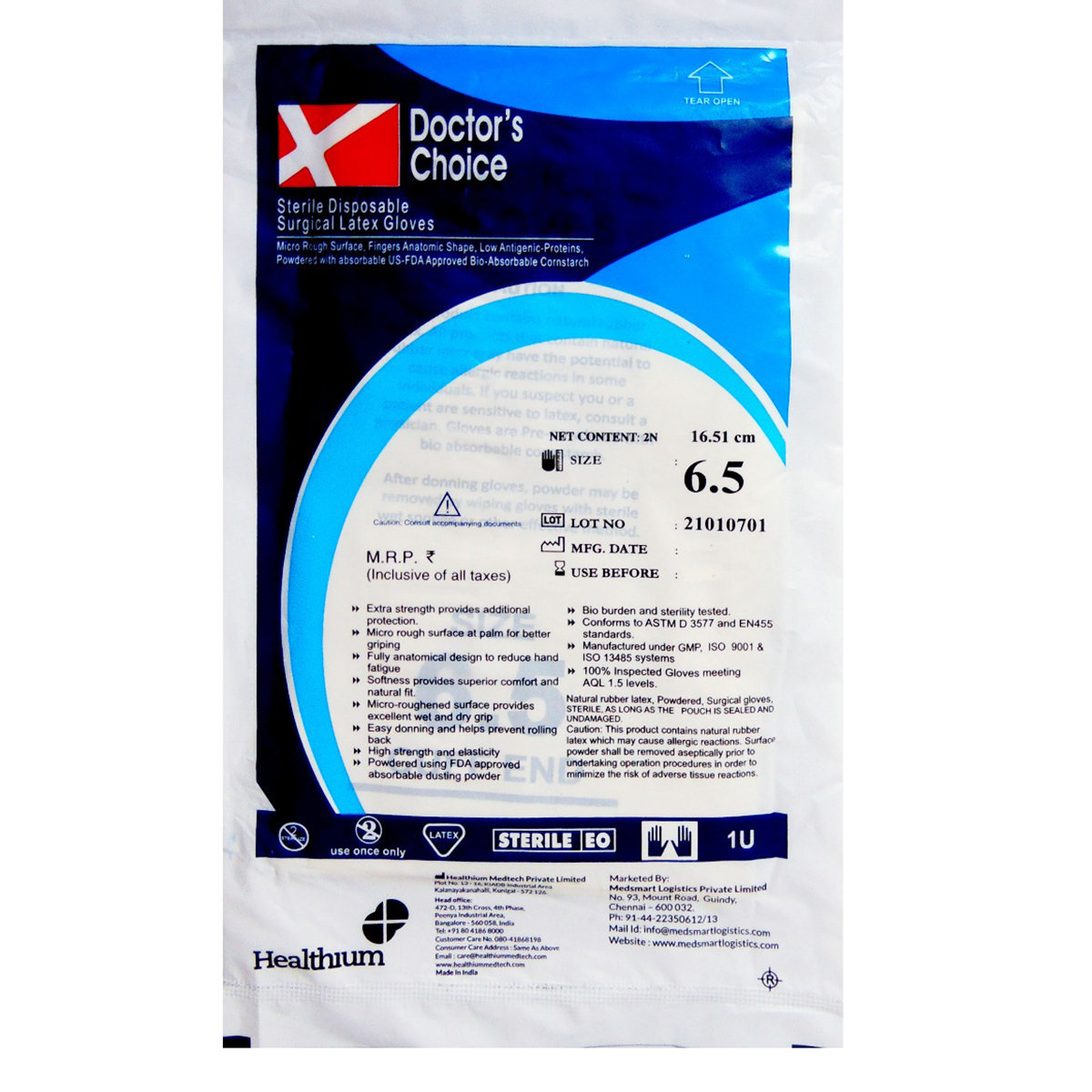Syntocinon Injection 1 ml


MRP ₹18.5
(Inclusive of all Taxes)
₹2.2 Cashback (12%)
Know Your Delivery Time
Provide Delivery Location

Secure Payment

India's Most Trusted Pharmacy

Genuine Products
Composition :
Manufacturer/Marketer :
Consume Type :
Return Policy :
Expires on or after :
NPPA :
About Syntocinon Injection 1 ml
Syntocinon Injection 1 ml belongs to the class of medication called 'oxytocic' or 'uterotonic', primarily used for initiating or improving uterine contraction (antepartum) and producing uterine contraction during the third stage of labour (postpartum). Besides this, it also controls postpartum bleeding or haemorrhage after childbirth. Labour induction stimulates uterine (womb) contractions during pregnancy before labour pain begins to achieve a vaginal birth. It is recommended by the doctor for labour induction for various reasons, especially when there is a concern for a mother's or baby's health.
Syntocinon Injection 1 ml contains a synthetic female hormone, 'Oxytocin', given in the intravenous (IV) form or intramuscular (IM) form that stimulates uterine muscles and increases the uterus' contractions. It also increases the production of a natural substance called prostaglandins (PGs), increasing contractions and hence inducing labour. As a result, these increased uterine contractions help deliver the child.
Your doctor will give Syntocinon Injection 1 ml before childbirth or during labour pain. Do not self-administer. The most common side effects of Syntocinon Injection 1 ml are nausea, vomiting, and headache. Most of these side effects of Syntocinon Injection 1 ml do not require medical attention and gradually resolve over time. However, if the side effects are persistent, reach out to your doctor.
If you ever had surgery on the uterus, cesarean or premature labour, please inform your doctor before taking Syntocinon Injection 1 ml to avoid complications. Also, mention all the other medications you are taking to affect how Syntocinon Injection 1 ml works. If you have been given prostaglandins, Syntocinon Injection 1 ml should not be given within 6 hours as both medications, if taken together, can increase the contractions. A Syntocinon Injection 1 ml should not be used for a prolonged time if the contractions do not improve, severe pre-eclamptic toxaemia (high blood pressure, protein in the urine, and swelling), or blood or heart circulation problems.
Uses of Syntocinon Injection 1 ml
Syntocinon Injection 1 ml is used in the treatment of Labour induction. The detailed uses of Syntocinon Injection 1 ml are as follows:
- Induction of Labor: Syntocinon Injection 1 ml stimulates uterine contractions to initiate childbirth when labor doesn't start naturally.
- Augmentation of Labor: Syntocinon Injection 1 ml strengthens and regulates contractions during labor to assist delivery.
- Postpartum Hemorrhage Control: Syntocinon Injection 1 ml promotes uterine contraction after delivery to reduce bleeding.

Have a query?
Directions for Use
- Follow your doctor's instructions on the dosage and timing of this medication to ensure safety.
- Syntocinon Injection 1 ml will be administered by the doctor or healthcare professional.
- Do not self-administer.
Medicinal Benefits
Syntocinon Injection 1 ml contains a female hormone primarily used in inducing labour. It plays a major role in childbirth by increasing uterus contractions and inducing labour in pregnant women. In addition to this, it is also used to stop bleeding after delivery and manage a miscarriage in cesarean section. When given in the intravenous form, Oxytocin stimulates uterine muscles and increases the contractions in the uterus. Also, it increases the production of prostaglandins, which further increases contractions and hence induces labour. As a result, these increased uterine contractions help deliver the child.
How Syntocinon Injection 1 ml Works
Storage
What if I have taken an overdose of Syntocinon Injection 1 ml
Drug Warnings
Do not take Syntocinon Injection 1 ml if you are allergic to Syntocinon Injection 1 ml or any of its ingredients. Increasing the dose of Syntocinon Injection 1 ml can be harmful if your womb already has too strong contractions, any obstructions in the pathway that might prevent the delivery or if the baby is not receiving a sufficient oxygen supply. Also, the use of Syntocinon Injection 1 ml is not advisable if the baby is wrongly positioned in the birth canal, the baby’s head is too large to fit through the pelvis, the placenta lies near the neck of the womb, the placenta separates from the womb before birth, the womb is over-extended and likely to tear (in case you are carrying more than one baby). If you have been given prostaglandins, do not use Syntocinon Injection 1 ml with 6 hours; if taken together, it can increase the contractions. Syntocinon Injection 1 ml should not be used for a prolonged time if the contractions do not improve or if you have severe pre-eclamptic toxaemia (high blood pressure, protein in the urine, and swelling) or blood or heart circulation problems. A professional should always administer Syntocinon Injection 1 ml at a hospital, do not practice self-administration. It should also not be given as a rapid injection into a vein as it might cause hypotension (low blood pressure) or suddenly increased heart rate.
Diet & Lifestyle Advise
- Long walks can help to relieve stress, keep your body strong, and assist in easy delivery.
- Please take a little Castrol oil as it stimulates prostaglandin, which ripens the cervix and gets labour started.
- For some food like dates, raspberry tea leaves are known to ripen the cervix and get labour started.
- Acupressure also stimulates labour and helps in delivery.
Habit Forming
Therapeutic Class
All Substitutes & Brand Comparisons
RX
Out of StockNot for online saleZYGON INJECTION 1ML
₹100
(₹90.0/ 1ml)
452% COSTLIER
Alcohol
Unsafe
Syntocinon Injection 1 ml should not be taken until prescribed if you are taking alcohol. Keep your doctor informed if you drink alcohol.
Pregnancy
Safe if prescribed
Syntocinon Injection 1 ml is used to induce contractions in the uterus so if given by the doctor for delivery it is safe.
Breast Feeding
Caution
Inform your doctor if you are a nursing mother. Your doctor will weigh the benefits and potential risks before prescribing Syntocinon Injection 1 ml.
Driving
Unsafe
Syntocinon Injection 1 ml can cause contraction of the uterus and lead to baby birth. So, driving a car may be highly unsafe.
Liver
Caution
Inform the doctor before receiving the Syntocinon Injection 1 ml if you have had a Liver impairment/disorder history. Your doctor will prescribe only if the benefits outweigh the risks.
Kidney
Caution
Inform the doctor before receiving the Syntocinon Injection 1 ml if you have had a Kidney impairment/disorder history. Your doctor will prescribe only if the benefits outweigh the risks.
Children
Caution
Syntocinon Injection 1 ml is not recommended for children below the age of 18 years. The safety and effectiveness of Syntocinon Injection 1 ml have not been established in children due to limited testing of this drug on children by competent authorities worldwide.
Heart
Consult your doctor
Please consult your doctor before using Syntocinon Injection 1 ml if you have pre-existing heart problems. Your doctor will prescribe Syntocinon Injection 1 ml if the benefits outweigh the risks.
Geriatrics
Consult your doctor
Please consult a doctor before administering Syntocinon Injection 1 ml to geriatric patients. Your doctor will prescribe Syntocinon Injection 1 ml if the benefits outweigh the risks.
FAQs
Syntocinon Injection 1 ml is used for initiating or improving uterine contraction (antepartum) and producing uterine contraction during the third stage of labour (postpartum). Besides this, it also controls postpartum bleeding or haemorrhage after childbirth.
Syntocinon Injection 1 ml when given in the intravenous form, labour induction stimulates uterine muscle contractions in the uterus. Also, it increases the production of prostaglandins, which further increases contractions and hence induces labour. As a result, these increased uterine contractions help deliver the child.
No, giving Syntocinon Injection 1 ml in the form of a rapid injection into a vein is not recommended as it might cause hypotension (low blood pressure) or suddenly increased heart rate. It should always be given as an intravenous infusion, and the doctor will monitor the speed.
If you have a previous premature delivery, a c-section, or cervical surgery, please inform your doctor before starting Syntocinon Injection 1 ml. Also, mention a detailed medical history to your doctor to avoid complications.
The most common side effects of Syntocinon Injection 1 ml include nausea, vomiting, headache, and increased blood pressure. You might also feel increased uterine contractions for some time, but these are manageable under medical supervision.
Syntocinon Injection 1 ml is given as an injection as an intravenous infusion at a hospital only under strict medical supervision. The dose to be administered will be decided by your doctor, depending upon your current medical situation.
Syntocinon Injection 1 ml belongs to the class of medication called oxytocic or uterotonic, primarily used for initiating or improving uterine contraction (antepartum) and producing uterine contraction during the third stage of labour (postpartum). Besides this, it also controls postpartum bleeding or haemorrhage after childbirth.
Syntocinon Injection 1 ml is usually administered by a qualified healthcare professional through an intravenous (IV) or intramuscular (IM) injection in a healthcare setting, with careful monitoring to ensure your safety during labor. The dose varies depending on the situation and will be carefully adjusted by your doctor based on your needs.
Country of origin
Manufacturer/Marketer address
Customers Also Bought
Disclaimer
Keep Refrigerated. Do not freeze.Prepaid payment required.
Author Details
We provide you with authentic, trustworthy and relevant information
Reference
- https://www.medicines.org.uk/emc/files/pil.9457.pdf
- https://www.drugs.com/mtm/oxytocin.html
- https://www.medicines.org.uk/emc/files/pil.9334.pdf
- https://www.nhs.uk/pregnancy/labour-and-birth/signs-of-labour/inducing-labour/
- https://www.healthline.com/health/pregnancy/natural-ways-to-induce-labor#nipple-stimulation.
Buy best Obstetrics And Gynaecology products by
Sun Pharmaceutical Industries Ltd
Corona Remedies Pvt Ltd
Serum Institute Of India Pvt Ltd
Akumentis Healthcare Ltd
Bharat Serums and Vaccines Ltd
Emcure Pharmaceuticals Ltd
Intas Pharmaceuticals Ltd
Cipla Ltd
Koye Pharmaceuticals Pvt Ltd
Torrent Pharmaceuticals Ltd
Abbott India Ltd
Zydus Healthcare Ltd
Lupin Ltd
Zydus Cadila
Gufic Bioscience Ltd
Jagsonpal Pharmaceuticals Ltd
Neon Laboratories Ltd
Walter Bushnell
Alembic Pharmaceuticals Ltd
Eris Life Sciences Ltd
Aristo Pharmaceuticals Pvt Ltd
Lincoln Pharmaceuticals Ltd
Mankind Pharma Pvt Ltd
Macleods Pharmaceuticals Ltd
Ajanta Pharma Ltd
Mylan Pharmaceuticals Pvt Ltd
Sanzyme Pvt Ltd
West Coast Pharmaceuticals Pvt Ltd
Xeno Pharmaceuticals
La Renon Healthcare Pvt Ltd
Samarth Life Sciences Pvt Ltd
Vivo Lifesciences Pvt Ltd
Pfizer Ltd
Systopic Laboratories Pvt Ltd
Ar-Ex Laboratories Pvt Ltd
Dewcare Concept Pvt Ltd
Micropolis Lifesciences Pvt Ltd
Remember India Medicos Pvt Ltd
Uniza Healthcare Llp
Zealina Life Sciences Llp
Amelia Healthcare Pvt Ltd
Bayer Zydus Pharma Pvt Ltd
Blisson Mediplus Pvt Ltd
Eurozen Healthcare
Ferring Pharmaceuticals Pvt Ltd
Glenmark Pharmaceuticals Ltd
Leeford Healthcare Ltd
Organon India Ltd
Vasu Organics Pvt Ltd
Wellesta Healthcare Pvt Ltd
Alkem Laboratories Ltd
Cadila Pharmaceuticals Ltd
Fourrts India Laboratories Pvt Ltd
Hetero Healthcare Pvt Ltd
Maneesh Pharmaceuticals Ltd
Pharmanova India Drugs Pvt Ltd
TTK Healthcare Ltd
Win Medicare Ltd
Zuventus Healthcare Ltd
Biological E Ltd
Blisson Medica Pvt Ltd
Cadila Healthcare Ltd
Cheminnova Lifesciences
German Remedies Ltd
Gland Pharma Ltd
Goddres Pharmaceuticals Pvt Ltd
Infallible Pharma Pvt Ltd
Integrace Pvt Ltd
Martin & Harris Pvt Ltd
Msn Laboratories Pvt Ltd
Nivian Pharma Llp
Oaknet Healthcare Pvt Ltd
Pharmanova Specialties Pvt Ltd
Shield Healthcare
Svizera Healthcare
Akesiss Pharma Pvt Ltd
Alena Lifesciences Llp
Bio Mines
Chem Med Pharmaceuticals
Eskag Pharma Pvt Ltd
Estragen Pharma Pvt Ltd
Hibiscus Pharmaceuticals Pvt Ltd
Hindustan Latex Ltd
Indiabulls Pharmaceuticals Pvt Ltd
Infar India Ltd
Jay Ell Healthcare Pvt Ltd
Liveon Health Care Pvt Ltd
Medgen Drugs And Laboratories Pvt Ltd
Medishri Healthcare Pvt Ltd
Obsurge Biotech Ltd
Ozone Pharmaceuticals Ltd
Saan Labs
Stoicure Pharmaceuticals Pvt Ltd
Syndicate Life Sciences Pvt Ltd
Synokem Pharmaceuticals Ltd
Uni Sankyo Ltd
Wayonext Pharmaceuticals Pvt Ltd
AQUINNOVA PHARMACEUTICALS
Albert David Ltd
Austen Biologicals















